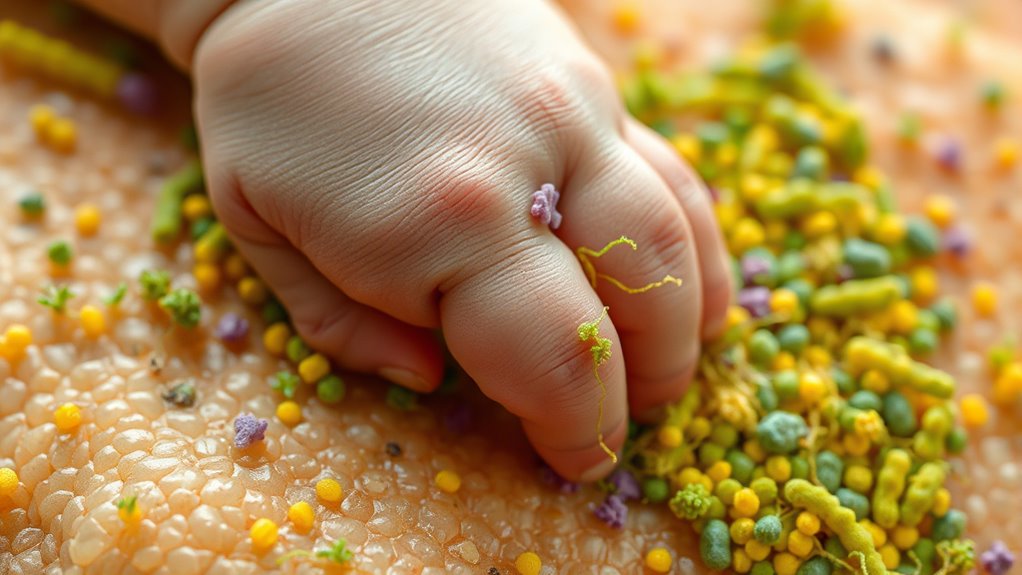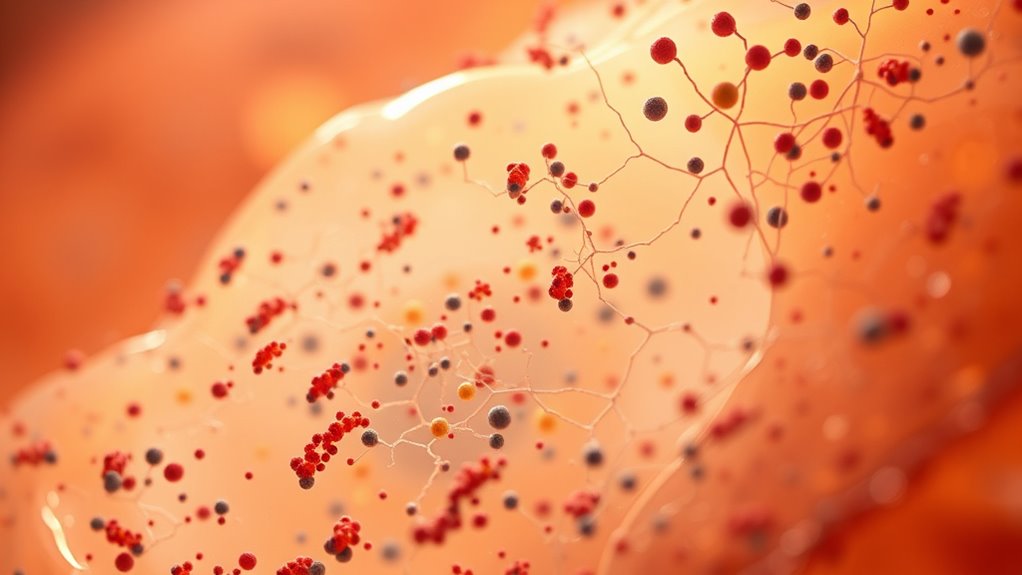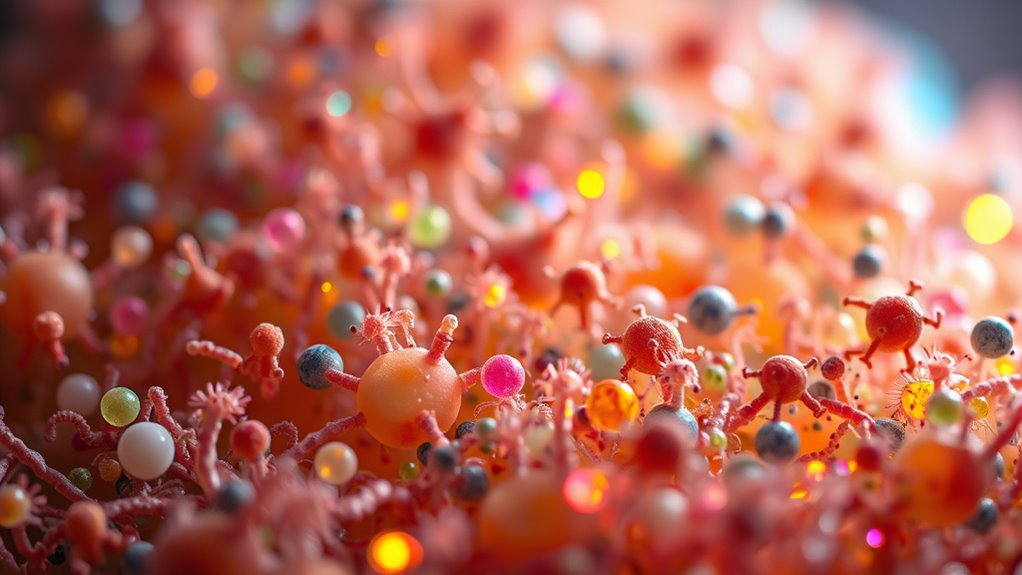Your microbiome is essential for developing your child’s immune system early in life. From birth, exposure to beneficial microbes signals immune tissues, helping them learn to distinguish harmful from harmless agents. Factors like delivery method, breastfeeding, and environment shape microbial diversity, influencing how well their immune system matures. Disruptions, especially from antibiotics, can impair this process, increasing illness risks. Discover how supporting a healthy microbiome can boost immunity and long-term health.
Key Takeaways
- The microbiome trains immune cells to distinguish harmful from harmless agents, promoting immune balance.
- Microbial exposure during birth and early life shapes immune development and long-term immune resilience.
- Beneficial microbes produce signals that stimulate immune tissue growth and antibody production.
- Microbiome diversity supports immune tolerance, reducing allergy and autoimmune risks.
- Disruptions to early microbial colonization, such as antibiotics or C-section delivery, can impair immune maturation.

MaryRuth Organics USDA Organic Infant Liquid Probiotic Drops | Baby Essentials | Probiotics for Infants | Baby Probiotic Drops | Proprietary Probiotic Blend | Vegan | Non GMO | 125 Servings
Baby Probiotic Drops: Easily give your infant these unflavored probiotic drops! Formulated with a proprietary blend of 5…
As an affiliate, we earn on qualifying purchases.
As an affiliate, we earn on qualifying purchases.
How the Microbiome Shapes the Developing Immune System

The microbiome plays a crucial role in shaping your developing immune system from the moment you’re born. It helps train your immune cells to distinguish between harmful invaders and harmless substances. When your microbiome is diverse, it teaches your immune system to respond appropriately, preventing overreactions like allergies or autoimmune diseases. Beneficial microbes produce signals that stimulate immune development, encouraging the growth of immune tissues and the production of antibodies. They also help regulate inflammation, ensuring it stays controlled. As your microbiome interacts with immune cells, it influences how your body responds to infections later in life. Essentially, a healthy, balanced microbiome acts as a training ground, guiding your immune system toward effective and balanced defenses.

Microbiome Labs Pregnancy Support – Prenatal & Postpartum Probiotics for Women – Probiotic Supplements to Support Gut Health & A Balanced Vaginal Microbiome Through Breastfeeding (30 Capsules)
Pre & Postnatal Probiotic for Mom & Baby Support – Designed for use during pregnancy through breastfeeding. Unlike…
As an affiliate, we earn on qualifying purchases.
As an affiliate, we earn on qualifying purchases.
Microbial Exposure During Birth and Its Impact on Immunity

Your baby’s first exposure to microbes happens during birth, especially from the birth canal. This early contact helps train the immune system to recognize beneficial bacteria and respond appropriately. These initial microbes set the foundation for a healthy immune development later in life.
Birth Canal Microbes
Have you ever wondered how a newborn’s first exposure to microbes influences their immune system? During delivery through the birth canal, your baby encounters a diverse array of microbes from the mother’s vaginal and intestinal flora. These microbes quickly colonize the baby’s skin, mouth, and gut, establishing their initial microbiome. This early microbial exposure helps train the immune system to distinguish between harmless and harmful organisms. The specific microbes present can vary depending on factors like maternal health and delivery method. By acquiring these microbes, your newborn gains essential signals that guide immune development, promoting tolerance to beneficial bacteria and preparing their immune defenses. This initial microbial contact sets the foundation for long-term immune health and resilience.
Early Immune Training
Microbial exposure during birth plays a pivotal role in shaping a newborn’s immune system from the very start. When you’re born through the birth canal, you encounter a diverse range of microbes that help train your immune responses. This early exposure teaches your immune system to distinguish between harmless and harmful agents, reducing the risk of allergies and autoimmune diseases later. If you’re born via cesarean section, your initial microbial contact differs, which can influence immune development. The microbes you encounter during birth activate immune cells, promoting proper immune regulation. This early immune training sets the foundation for lifelong immune health. The more diverse your initial microbial exposure, the better your immune system learns to protect you effectively. Understanding microbial colonization can help explain how early life influences long-term immune outcomes.

Garden of Life Dr. Formulated Probiotics Once Daily Prenatal – Acidophilus and Bifidobacteria Probiotic Support for Mom and Baby – Shelf Stable – Gluten, Dairy, and Soy-Free – 30 Vegetarian Capsules
PRENATAL DIETARY SUPPLEMENT: Garden of Life Once Daily Prenatal offers daily probiotic support during pregnancy and lactation*
As an affiliate, we earn on qualifying purchases.
As an affiliate, we earn on qualifying purchases.
The Gut Microbiome’s Role in Immune Cell Maturation

Your gut microbiome directly influences how your immune cells develop and differentiate. It provides vital signals and factors that guide immune cell maturation, shaping your body’s defense system. Understanding this connection helps explain how early microbial exposure impacts lifelong immunity. Incorporating mindfulness techniques such as deep breathing and visualization can also support immune health by reducing stress and promoting overall well-being.
Microbial Influence on Development
The gut microbiome plays a crucial role in shaping the development of the immune system, especially during early life. It influences how your immune cells mature, teaching them to distinguish between harmful pathogens and harmless substances. Microbes release signals that stimulate immune structures like the gut-associated lymphoid tissue, promoting proper immune responses. They also help develop immune tolerance, reducing the risk of allergies and autoimmune conditions later on. During infancy, your microbiome’s composition impacts the balance of immune cell types, ensuring a healthy immune system. If this microbial community develops properly, it sets the foundation for effective immune defenses throughout life. Conversely, disruptions early on can hinder immune development, increasing vulnerability to diseases. Your early microbial environment truly shapes the trajectory of your immune health. Additionally, the role of microbiome diversity is vital in fostering a resilient and adaptable immune system.
Immune Cell Differentiation Factors
As the immune system develops, specific signals from the gut microbiome guide the differentiation of immune cells into their specialized forms. You benefit from microbiome-produced molecules like short-chain fatty acids, which influence T cell development, promoting regulatory T cells that prevent inflammation. Microbial antigens interact with dendritic cells, shaping their ability to present antigens and instruct naive T cells to become helper or cytotoxic cells. Certain bacteria release metabolites that encourage the maturation of B cells into antibody-producing plasma cells. These microbial signals help fine-tune your immune responses, ensuring they are balanced and effective. Without proper microbial cues, immune cell differentiation can be impaired, increasing susceptibility to infections or autoimmune conditions. Essentially, your gut microbiome acts as a critical director in shaping your immune defenses. Additionally, understanding AI security risks and how to mitigate them is crucial as technology increasingly influences health research and diagnostics.

Mommy's Bliss Organic Baby Elderberry Drops, Immune Support with Vitamins, Prebiotics, Zinc & Organic Echinacea, Age 4 Months +, 3 Fl Oz (36 Servings)
Immune Support for Babies: Designed for babies 4 months and up, our baby immunity syrup contains organic elderberry,…
As an affiliate, we earn on qualifying purchases.
As an affiliate, we earn on qualifying purchases.
Early-Life Factors That Influence Microbial Diversity

Early-life factors play a crucial role in shaping microbial diversity, which in turn influences the development of the immune system. Your mode of delivery markedly affects initial microbial exposure; vaginal birth introduces you to maternal microbes, fostering diversity, while C-sections may limit this exposure. Your diet during infancy also impacts your microbiome; breastfeeding provides beneficial bacteria and nutrients that promote healthy microbial growth. Antibiotic use early in life can reduce microbial variety, potentially impairing immune development. Environmental exposures, such as siblings, pets, and outdoor activities, introduce new microbes that support immune maturation. Additionally, hygiene practices influence microbial diversity—overly sterile environments may restrict beneficial microbial interactions. Trust issues in your environment and relationships can also affect microbial exposure, influencing immune responses. These early-life factors collectively shape your microbiome, setting the foundation for your immune system’s future responses.
The Connection Between Microbiome Imbalance and Childhood Illnesses

Imbalances in your microbiome can directly influence your susceptibility to childhood illnesses. When beneficial bacteria decrease or harmful bacteria dominate, your immune system struggles to respond effectively. This imbalance can lead to increased risks of infections like ear infections, respiratory illnesses, and gastrointestinal problems. A disrupted microbiome weakens the development of immune defenses during early childhood, making it harder for your body to fight off pathogens. Factors such as antibiotic use, poor diet, or lack of exposure to diverse microbes can contribute to these imbalances. The more your microbiome shifts away from a healthy, diverse state, the more vulnerable you become to illnesses. Microbial diversity plays a crucial role in shaping a resilient immune system. Maintaining microbial balance is vital for supporting your immune system and reducing your child’s risk of frequent or severe infections.
Probiotics and Prebiotics: Supporting a Healthy Microbial Environment

Probiotics and prebiotics play a crucial role in maintaining a healthy microbiome, which is essential for supporting your child’s immune system. Probiotics are live beneficial bacteria that help balance gut flora, while prebiotics are fibers that feed these good bacteria, promoting their growth. Incorporating these into your child’s diet can improve immune response and reduce illness risks. To optimize their benefits, consider:
- Including fermented foods like yogurt and kefir in meals
- Offering fiber-rich fruits, vegetables, and whole grains
- Using supplements, if recommended by a healthcare professional
- Being aware of the toilet flushing mechanisms that impact overall hygiene and sanitation, which can influence microbiome health.
Microbiome-Immune Interactions in Preventing Allergies and Autoimmune Diseases

Your microbiome plays a vital role in shaping immune development, helping your body distinguish between harmless and harmful substances. This interaction helps balance tolerance and reactivity, reducing the risk of allergies and autoimmune diseases. Understanding this connection can guide strategies to strengthen immune health from early life.
Microbiota and Immune Development
The development of a healthy immune system relies heavily on the interactions between the microbiota and immune cells during early life. These interactions influence how your immune system learns to distinguish harmful from harmless agents. A diverse microbiota helps train immune cells, promoting tolerance and preventing overreactions. It also shapes the maturation of key immune components, such as regulatory T cells and antibodies. By establishing a balanced microbial environment, you reduce the risk of allergies and autoimmune conditions. Enhanced supportive solutions like probiotic interventions can further promote healthy microbiota development.
Microbial signals guide the differentiation of immune cell lineages. Early microbiota exposure influences cytokine production and immune regulation. Specific microbial species are linked to the development of immune tolerance.
Balancing Tolerance and Reactivity
Balancing immune tolerance and reactivity is essential for preventing allergies and autoimmune diseases, and the microbiome plays a pivotal role in this process. Your microbiome helps train your immune system to distinguish harmful from harmless stimuli, preventing overreactions. When this balance tips, allergies or autoimmunity can develop. Certain microbes promote regulatory immune responses, while others may trigger reactivity. Understanding this interplay can guide strategies to maintain harmony. Here’s a quick overview:
| Microbial Influence | Immune Outcome |
|---|---|
| Beneficial microbes | Promote tolerance, reduce allergies |
| Pathogenic microbes | Increase reactivity, trigger autoimmunity |
| Microbiome diversity | Supports immune regulation |
Maintaining a healthy, diverse microbiome is key to keeping your immune system balanced. Quotes about fatherhood highlight the importance of nurturing and support, which can be metaphorically related to fostering a healthy microbiome for immune health.
The Impact of Antibiotics on Early Microbial and Immune Development

Antibiotics, while essential for treating bacterial infections, can considerably disrupt the developing microbiome in early life. This disruption can hinder the establishment of beneficial microbes *vital* for immune system maturation. When antibiotics wipe out key bacterial populations, you risk impairing immune tolerance and increasing susceptibility to allergies, asthma, and autoimmune conditions. The effects can be lasting, altering microbial diversity and function well into childhood. To deepen understanding, consider how antibiotics:
- Reduce microbial diversity, limiting immune training
- Promote antibiotic-resistant bacteria, complicating future treatments
- Interfere with the colonization of beneficial microbes essential for immune development
- Bacterial populations play a crucial role in shaping the developing immune system, and their disruption can have long-term consequences.
Strategies for Promoting Microbial Diversity in Infants and Children

Promoting microbial diversity in infants and children is essential for supporting healthy immune development. To achieve this, you should consider encouraging natural childbirth when possible, as it exposes your child to maternal microbes critical for early colonization. Breastfeeding also plays a fundamental role by delivering beneficial bacteria and prebiotics that foster diversity. Avoid unnecessary antibiotic use, because antibiotics can wipe out beneficial microbes, reducing diversity. Introducing a variety of solid foods around six months helps diversify the microbiome through different fibers and nutrients. Limiting overly sterile environments and encouraging outdoor play can expose your child to diverse microbes from nature. These strategies support a resilient and balanced microbiome, which is necessary for ideal immune system training and long-term health.
Future Directions in Microbiome Research and Immune Health

Advances in microbiome research are opening new avenues to understand and enhance immune health from early life onward. Future studies will likely focus on personalized microbiome interventions tailored to individual genetic and environmental factors. You can expect to see developments in probiotic and prebiotic formulations optimized for immune support during critical growth periods. Additionally, integrating microbiome analysis into routine healthcare could enable early detection of immune-related disorders. To achieve these goals, researchers are exploring:
Microbiome insights promise personalized immune support and early health interventions.
- Advanced sequencing technologies for precise microbial profiling
- Longitudinal studies tracking microbiome-immune interactions over time
- Synthetic biology approaches to engineer beneficial microbes
These innovations hold the potential to revolutionize immune health strategies, making early interventions more targeted and effective.
Frequently Asked Questions
How Does the Microbiome Influence Vaccine Effectiveness in Children?
You might wonder how the microbiome affects vaccine effectiveness in children. It influences your child’s immune responses by shaping immune cell development and balancing inflammation. A healthy microbiome helps the immune system recognize and respond efficiently to vaccines, leading to better protection. Disruptions, like antibiotics or poor diet, can weaken this effect. Ensuring a diverse, balanced microbiome can enhance vaccine responses and overall immunity in children.
Are There Specific Foods That Promote a Healthy Early-Life Microbiome?
Did you know that feeding your child a diverse diet can boost their microbiome? Yes, certain foods like fruits, vegetables, whole grains, and fermented products promote beneficial bacteria growth. Including fiber-rich foods helps feed good microbes, supporting a resilient immune system. You should aim for a variety of these foods daily, as a balanced diet nurtures a healthy early-life microbiome, which is essential for their overall health and immune development.
Can Microbiome Analysis Predict Future Immune-Related Health Issues?
You might wonder if microbiome analysis can forecast future immune problems. While research shows correlations between microbiome composition and health outcomes, it’s not yet precise enough to predict specific issues. By examining your microbiome, scientists can identify potential risks, but it doesn’t guarantee future health concerns. You should focus on maintaining a balanced microbiome through diet and lifestyle, which can support overall immune function and reduce future risks.
What Role Do Environmental Factors Play in Shaping Infant Microbiomes?
Think of the infant microbiome as a garden you’re cultivating. Environmental factors are like sunlight, water, and soil quality that shape its growth. Your choices—breastfeeding, exposure to pets, and hygiene habits—directly influence which microbial seeds thrive. These factors help determine the diversity and balance of your baby’s microbiome, laying the foundation for their immune health. So, nurturing a healthy environment supports a resilient, flourishing microbial community.
How Do Microbiome Changes Correlate With Developmental Milestones?
You notice that as your child reaches developmental milestones, their microbiome also changes. For example, when they start eating solid foods, their gut bacteria diversify, supporting digestion and immune development. These microbiome shifts often align with physical and cognitive growth, indicating a strong connection. By observing these patterns, you can better understand how microbiome development influences overall health and supports your child’s ongoing development.
Conclusion
Imagine your immune system as a garden, and your microbiome as its diligent gardeners. When these gardeners are nurtured with diverse microbes early on, your garden flourishes—strong, vibrant, and resilient. But if the gardeners are neglected or overrun by weeds like antibiotics, the garden struggles to thrive. By understanding and supporting your microbiome, you help your immune garden grow resilient and healthy, ready to face any storm that comes its way.








